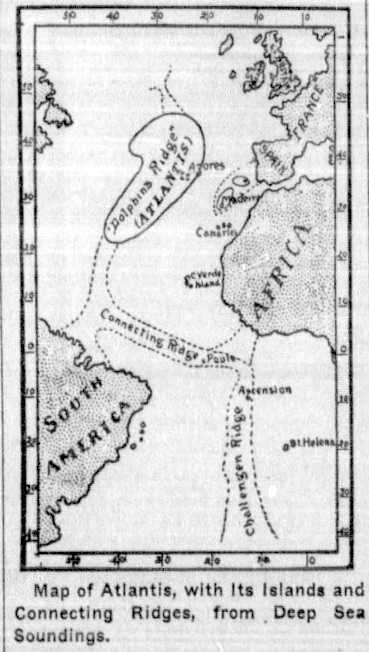
The following Atlantis theory was originally published in 1908 and discusses the possible position of the once great island.
Atlantis Theory
New Discoveries Which Indicate That the Ancient Island Was Connected North and South, Not East and West
The old Atlantis theory that diluvian man crossed from the eastern to the western world on dry land and that land later sinking below the level of the present Atlantic ocean has been questioned by scientists of the United States government, who have discovered ruins and remains which support a new theory that the ancient island was connected north and south and not east and west.

The two incidents bearing on the matter of an Atlantis occurred in January. the first was the submission of a report to the bureau of ethnology by Dr. J. Walter Fewkes after he had spent months studying the origin of the first inhabitants of the island of Puerto Rico. The second was the mysterious and complete disappearance of certain large islands off the coast of Yucatan.
Yucatan has been credited with having been the original distributing point from which primitive peoples migrated into South America and into Mexico. This sinking of large tracts of land in a night lends color to the theory that there once existed an immense continent where the Atlantic now is and that with the washing away of this continent and the subsequent collection of its composition to east and west the greater part of Europe and North America were formed.
According to the ancients from whom we have our first intimation of the existence of Atlantis, there once existed in the Atlantic ocean, opposite Mt. Atlas, a great island adorned with every beauty and possessed of a numerous population. Its princes were powerful and they invaded Europe and Africa where they were victorious until finally they were defeated by the Athenians and their allies.
After this, mythology says, the inhabitants of Atlantis degenerated into impiety and the great island was, in consequence, swallowed up in a day and night.
Dr. Fewkes, who was assigned shortly after the acquisition of the island of Puerto Rico by the United States, to study the ethnology of the island and who spent several seasons there, has formed a new opinion altogether and declares that the theory that the early people of that island and the adjoining islands came from Yucatan and that the early Yucatanese were immigrants from the island of Atlantis, is quite wrong. He says that the early Puerto Rico came from South America with which the islands were once connected.
Referring directly to the theory of Atlantis, Dr. Fewkes says in his report: “It is pertinent in the consideration of the peopling of the West Indies to give weight to the possibility that profound geological changes in the contours of the islands may have taken place since man first colonized them. Have the lesser Antilles been geologically connected with South America in times so recent that man may have migrated to them dry shod, or was Cuba continuous with North America at the time when the former received its first human inhabitants?
“Those who have investigated the subject claim great age for the remains of man in these regions. Climatic conditions, such as existed, for instance, in the glacial period, may have rendered the greater part of North America unfit for human occupation, but man may have lived in the West Indies when the whole northern part of North America was uninhabitable and the Antilles were continuous land from north to south.”
Thus the government assails the theory of Atlantis by inserting the words “north to south,” which formerly read “east to west.”
This is a shaft at the theory held by learned men of note that Yucatan was the original distributing point at this side of the globe and that while the Yucatanese came from Atlantis the people of Atlantis came from Egypt. Other scientists reversed this order and had the Egyptians originate in Yucatan.
Source: The Chickasha daily express. (Chickasha, Indian Territory [Okla.]), 15 June 1908.

